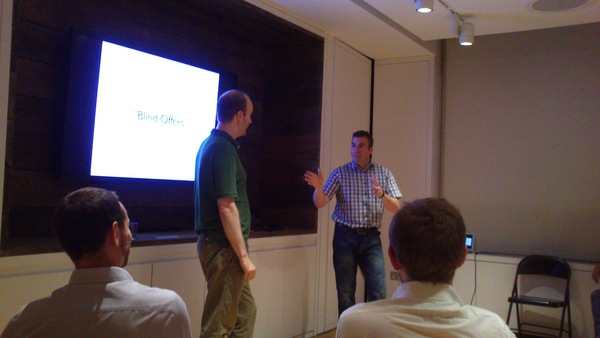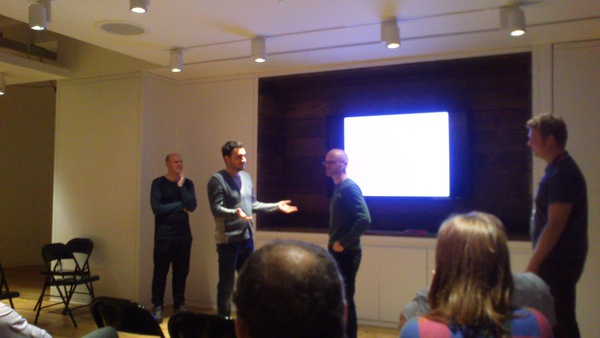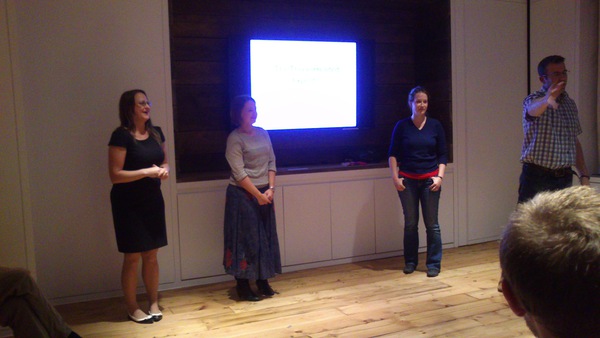We are always told or talking about how important collaboration is, but very few people actually take time to practice it and unleash it’s full potential. Improvisational Theatre (or Improv, as it’s more affectionately known) requires the actors on stage to collaborate effectively to build a scene, with no pre-written script.
 Paul Goddard has studied and practiced improv, tailoring a variety of simple games he plays with agile teams to help illustrate the power of collaboration and its creative benefits.
Paul Goddard has studied and practiced improv, tailoring a variety of simple games he plays with agile teams to help illustrate the power of collaboration and its creative benefits.
Viola Spolin (1906-1994) was an important innovator of the American theater in the 20th century. The Improv started from teaching kids a second language and using games the children picked up the words quicker. She also published a book called “Improvisation for the Theatre”.
Then Second City was formed in Chicago as an improv group with the likes of Mike Myers to Steve Carell. Then Keith Johnstone bought improv to the UK. Paul spends time in the Comedy Store watching these techniques and seeing how they can be used in everyday business to improve successful delivery of projects.
 Gift box Exercise
Gift box Exercise
2 people
1 person is holding an imaginary box
Person 2 takes things out and both people need to agree that it is what is said and state that they agree.
It is Collaboration exercise that shows you need to let go and not be afraid to be wrong or silly
Yes and…
Yes shows: And comes from collaboration…
Appreciation Adding
Acknowledgement Building
Heard Collaborating
Validation Connecting – Inspiring, Creating
Encouragement
Acceptance
Collaborating is a willingness to share, accept and sacrifice for something better as a team
Continuation of the Gift box game is – What I like about your idea is… And….
Offers are the basic unit of currency for improv – Neil Mullarkey
Provide, listen and extend offers
 Blind offers
Blind offers
An example of an offer is “good morning doctor”, “good morning nurse”
Person 1 mimes an offer, person 2 interacts with the offer and afterwards if they shake hands if they agree
EXAMPLES – open a window, bounce a ball
 Delight
Delight
Tell a story
Person 1 tells a story and person 2 Can only say no (block)
Person 1 then have to update the story as this happens
Maximise offers and minimise blocks (stops moving forward)
Yes, but… Is a block
You need to be able to turn a block into an offer
A great collaborator knows how to turn a block into an offer – Neil Mullarkey
One word at a time storytelling
The day we went to the airport…
With a team of least four
Can fire out to the audience for suggestions
Improv is in the moment, you can’t plan in advance with meetings so you need to be able to think on your feet and turn blockers into offers
Good offers = specifics
These make the next few words go quickly
What’s the first word that comes into your head
Can’t know where it’s going
Collaboration is the merging of ideas as no one person had control
It’s exciting when you don’t know what’s happening next
Improv is like a man walking backwards, don’t know what is going to happen but can learn from the past to shape the future Equal responsibility and ability to contribute
Esther Derby wrote a good book on retrospectives
One word games can be played in the retrospective or sprint goals:
The moral of this sprint was and then one word each
Sprint goals – the point of this sprint is…
 Questions only
Questions only
4 people 2 opposite each other
2 meet and then you can only converse in questions
Shout die if not a questions of no words
Start with: In a supermarket
Offers
Naturally programmed to provide solutions
Used to ask more questions rather than give answers, make sure you dig down
What do you think we should do?
If you don’t know – ask the team
 The three headed expert
The three headed expert
Ask questions
1 word answer, collaboration, all equal
Choose a theme to ask/answer questions on
Interviewer provides offers – the coach has to ask the next question, don’t know what the answer will be and need to ask the next one to be easy to answer
Need open questions not closed
These games were good fun and got the group up, interacting with each other, laughing about the silliness rather than being embarrassed. It will be interesting to try some of these techniques out and see how these can get teams to be more collaborative, having an equal say in projects. Paul ran a great session and it was good to see everyone get so involved and by the end of the night actually enjoyed looking silly having fun.
If you’re interested in finding out more and how these games can be used in your teams don’t hesitate to ask.
